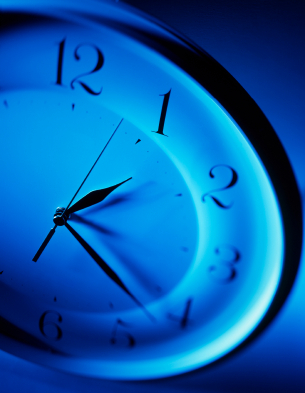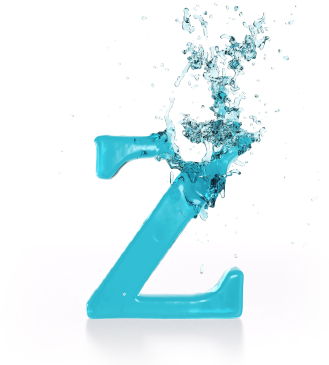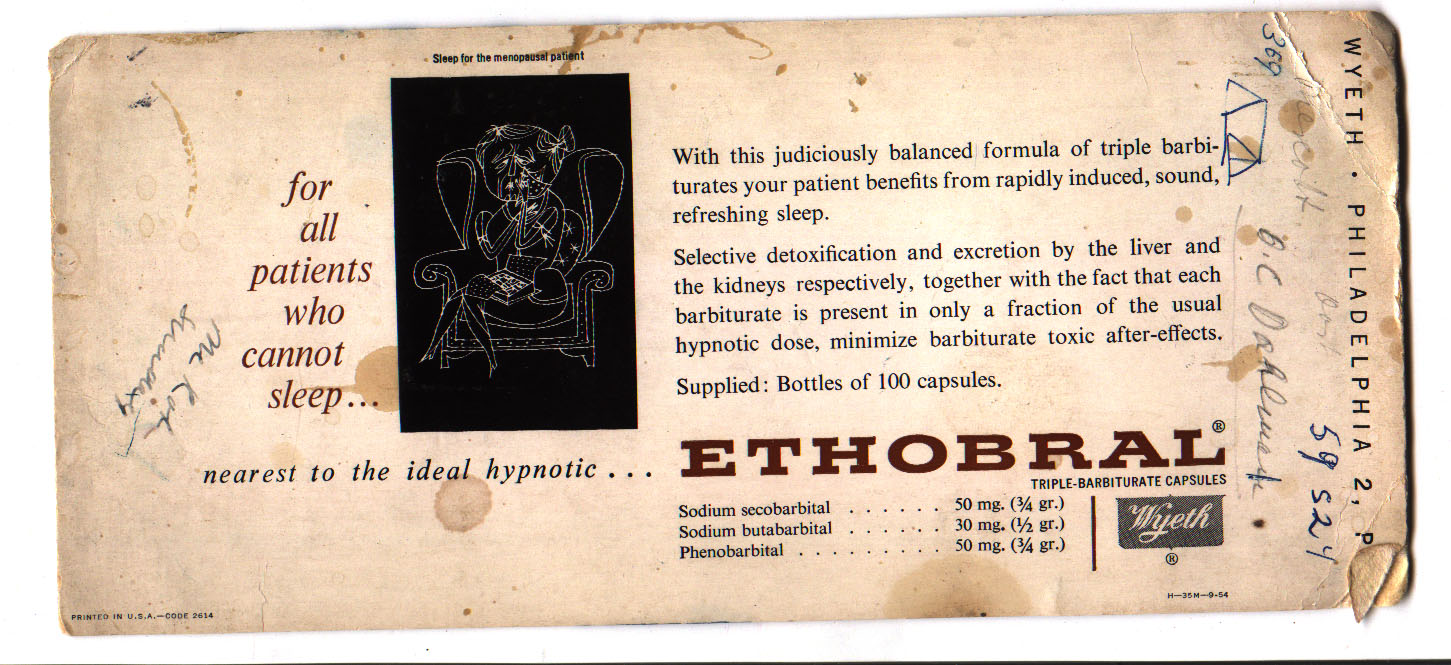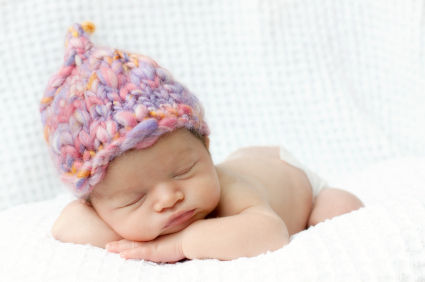Household work..the key to better sleep?
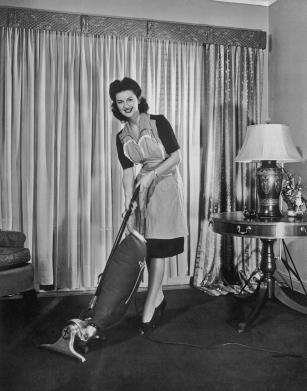 Have I got your attention yet?!
Have I got your attention yet?!
It’s no surprise that hot flashes and night sweats rank among the most important factors when it comes to poor sleep. However. less clear are the factors that may provide a buffer against the flashes. And aside from the usual suspects e.g., crankiness and moodiness or the inability to focus, poor sleep has been linked to heart disease and obesity, among other less desirable health conditions.
So, what can you do?
I’ve written about the benefits of physical activity and amelioration of menopausal symptoms many times on Flashfree. And, I imagine I will continue to do so. But what about sleep? There is evidence that physical activity can help bolster both sleep quality and sleep quantity. Yet, few people have examined the domino effect, i.e. fewer hot flashes ← physical activity → better sleep. Moreover, even fewer have considered the benefits of non-leisure physical activity, like housework.
Now, before you accuse me of setting women back 60 or 70 years, let’s consider exactly what I am suggesting.
According to research, women participate in less leisure time physical activity but greater levels of household physical activity than their male peers. This is apparently truer among ethnicities other than Caucasian (especially African American), who also tend to have greater levels of obesity and poorer sleep characteristics. So, it would follow that by increasing both, women might fare better in the sleep department, right?
In fact, when researchers took a small group of women participating in the larger SWAN study and evaluated their self-reported and scientifically measured sleep patterns for four nights, that is exactly what they found. The group, which was comprised of both White and African-American women, reported having flashes or sweats, were between the ages of 54 and 63, had an intact uterus and were not on medications that could affect hormone levels or symptoms. And while the number of women was quite small (only 52), they fit into the full spectrum of BMI targets (from normal to obese to overweight). In addition to sleep patterns, they also shared details of their most common daily physical activity (how often, how long and how intense) and household/caregiving responsibilities (time spent caregiving, preparing/cleaning up after meals, and routine chores as well the intensity of these activities).
Not surprisingly, women who had greater levels of leisure physical activity were 8 times more likely to report that their sleep quality was better than their less active peers. And, women who reported greater household, non-leisure physical activity awakened fewer times during the night, but only if their BMI levels were lower. Yet, the benefits were mostly seen more among White women. Even more troubling is that the researchers say that they could not determine the ‘why’ of these findings, even though they conducted several different types of analyses and comparisons.
The good news is that for some women, engaging in greater levels of household physical activity and leisure physical may reduce sleep disturbances, especially if they are not overweight. For others, especially my African-American sisters, the mystery remains. African-American women often report more severe hot flashes than their White peers. And while experts have pointed fingers towards rates of obesity or distinctions in estrogen levels or smoking history, the reasons remain unclear.
Meanwhile, while I am not necessarily suggesting that you increase your household responsibilities, I do believe that even with the limitations of this study, more physical activity may beget better sleep and possibly fewer or less severe hot flashes. Finally? Can we please find some effective and viable strategies for women of colour? Although the menopause experience may vary by ethnicity, as women, we need to find solutions that work for most of us, not some of us.
Read MoreExercise and sleep. Sleep and exercise. Does it? Or doesn’t it?
Among the many repeated themes on Flashfree, exercise and sleep rank highly. After all, exercise and physical activity are musts for women as they age. And sleep? Well, that goes without saying. However, although study findings have been fairly consistent with regard to connecting regular or vigorous physical activity to a reduction in some menopausal symptoms, the verdict is still out on sleep.
Sleep. Let me tell you; I sure could use some help in that department!
So what’s the latest and greatest? Does it? Or doesn’t it? Well, a study reported last month in the early online edition of Maturitas journal suggests that it might. The researchers write that studies that have evaluated the effects of aerobic activity on sleep are few and far between, and the results, contradictory. Still, they examined what would happen if they took a group of 176 sedentary women between the ages of 43 and 63 and subjected them to aerobic exercise training for six months. The exercise that half the women were asked to do consisted of 50 minutes of walking (or nordic walking with sticks) for two sessions and other aerobic activity for two sessions per week. The degree of the exercise was moderate, corresponding to about 64% to 80% of their target heart rates. The other half of the group remained sedentary. But both were asked to report via mobile phones how much hot flashes disrupted their sleep, and how much they slept every day on a scale of 1 to 5 (5=good, 1=poor).
The findings were pretty favourable. Women who exercised for 6 months experienced a 2% improvement in sleep quality compared to the women who didn’t (whose sleep quality, incidentally, declined by a half percent). Moreover, the exercise group, who had reported having hot flashes disturbing their sleep changed their tune by six to 10 weeks after starting their four times weekly routines and reported significantly fewer episodes than their sedentary peers.
Some may question that methods used to collect information; for example, studies that rely on recall are often called into question for accuracy and mobile phone data collection is uncommon. Still, the study was longer that most and the researchers validated their findings by scientific methods. That aside, since many readers come here to read the bottom line, is that regular exercise may improve sleep. It definitely affects quality of life and has a positive emotional benefit. Whether or not a 2% improvement is enough is really subjective. For me? I am happy to sleep through the night these days!
Read MoreWednesday Bubble: Bursting the Zzzzzzs
Got sleep? If you are like me, you’ve been trying to burst this elusive bubble for years now. That’s why I was so intrigued when I received a note from a research assistant from Stanford University, asking for help in recruiting participants for a study that they are conducting.
Researchers in the department of clinical psychology are attempting to tease out the association between menopause and sleep disturbances, as well as treatment preferences, in order to develop behavioral strategies to combat insomnia and hot flashes/night sweats. Sounds intriguing, right? Hence, they need your opinions and 15 minutes of your time, anonymously.
Hey, why not?!
The online survey, which can be found here, may eventually lead to more evidence-based non-drug therapies for menopausal symptoms. And you may have a role in helping burst the Zzzzs bubble!
Read MoreI put a spell on you?
Any regular reader of this blog knows that I love vintage advertising, namely because it’s so medically and politically inappropriate for today’s times.
I stumbled across this doosie in my weekly research:
Barbituates – they’re not for the 60s any longer. In fact, even Wyeth Pharma got ‘down’ on this triple barb combination first produced in 1936 and taken off the market in 1996. That’s sixty years of drug haze-induced. hypnotic sleep, including Marilyn Monroe’s. But I digress.
Ethobral was also used for menopausal women in dire need of a few ‘zzzs – check out the small copy above the graphic:
Sleep for the menopausal patient.
I put a spell on you? Indeed. A spell called Ethobral. I wonder how many women were hooked on these baby barbs in the 1930s, ’40s and ’50s!
Read MoreWhen was the last time you slept
…like a baby?
Yawning again? It’s not daylight savings time, promise! In fact, it may very well be your mood, at least in part.
I’ve been writing about sleep (or lack thereof) and menopause since first starting this blog in 2008. Click on the link and you’ll see posts about causes, solutions, pillows, sheets, you name it. And yet, I wouldn’t be surprised if sleep eludes you from time to time as much as it does me. More importantly, I imagine that some of you in the Flashfree universe don’t sleep much at all.
What gives?
Anxiety. And depression. That’s what. At least according to new data appearing in the online version of Maturitas journal. This time, researchers in search of some answers about sleep difficulties in midlife examined medical records of 237 women in peri- and postmenopause, all of who were on average, 52 years old. More specifically, they delved into answer that the women had provided to previous questionnaires about their life quality (based on physical and mental health, life satisfaction and social involvement) and degree of anxiety and/or depression. Within these questionnaires were measures of menopause-specific symptoms as well as sleep issues, including difficulty falling asleep and sleep that was non-restorative.
Overall, and unsurprisingly, about 36% of the women expressed difficulty falling asleep and 44% nonrestorative sleep during at least half the week. Almost a third experienced both issues at least 3 nights a week. Yet, sleep difficulties were less associated with menopausal symptoms (night sweats, hot flashes, nausea, dizziness, muscle/joint pain, headaches) and rather, with psychological statse of being. Indeed, trouble falling asleep seemed to be mostly correlated with anxiety, while non-restorative sleep was linked to depression.
This is not the first time that researchers have linked mood disorders to sleep issues. And although the progression is not entirely clear, i.e. the time course over which depression and anxiety develop during the transition to influence sleep, what is clear is that treating the underlying issues may ultimately help improve sleep quality.
What about you? Do you find that feeling blue or anxious tends to rob you of much needed zzzs? Or are you more convinced that waking up drenched in sweat is what is messing with obtaining restorative sleep?
Inquiring minds…
Read MoreWednesday Bubble: Cherry juice and sleep. Yup, sleep!
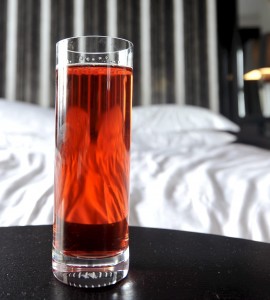 I have to admit; when I first saw the headline I was a wee bit skeptical:
I have to admit; when I first saw the headline I was a wee bit skeptical:
“Cherry juice gives a good nights’ sleep.’
Yeah, so does a knock on the head or an Ambien. But when I delved deeper, I found myself thinking, “wow,” who knew?!
Cherry juice, namely cherries of the Montmorency variety (aka a tart or sour cherry) have been found to significantly increase melatonin levels (a hormone that regulates sleep, among other functions) in the body, hence promoting sleep. In fact, researchers from Northumbria University in the North of England report that men and women who drank at roughly an ounce of tart cherry juice diluted with water twice a day for a week actually increased the time spent asleep by 25 minutes and experienced up to a 6% improvement in sleep quality. They also reported less time spent napping during the day than their peers who drank diluted fruit juice. And, when researchers delved deeper into cherry juice qualities, they found that it actually boosted melatonin levels by as much as 16%.
What’s most interesting about this study, at least from where I sit, is that the researchers say that they were originally interested in how tart or sour cherries would help muscles recovery from strenuous exercise because sleep plays an important role in the recovery process. However, this side finding means that cherry juice “has the potential to be applied as a natural intevention not only to athletes but to other populations with insomnia.”
Mind you, this study only examined the potential of tart cherry juice in 20 people up to age 40. Me? I would like to see if it works in postmenopausal women who experience major sleep disruptions due to hormone fluctuations. But if anything, I concur that the study definitely provides us with “more evidence surrounding the relationship between how we sleep and what we consume.”
Just a bit of cherry fodder for a Wednesday.
p.s. Not sure if the cherry pie at your Thanksgiving table can supplement that turkey zzzs but it certainly can’t hurt!
Read More






